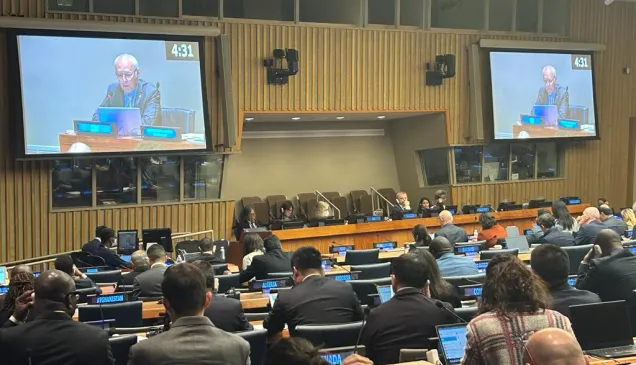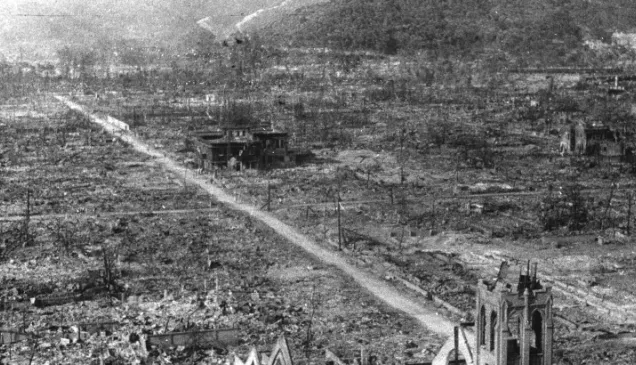The International Committee of the Red Cross (the ICRC) is very pleased to attend this important event to commemorate the International Day on the Elimination of Nuclear Weapons. This day is a reminder of the importance and urgency of ridding the world of the most destructive weapon ever created. It is also a reaffirmation of the fact that the international community is united to achieve the goal of a nuclear weapon-free world.
The International Movement of the Red Cross and Red Crescent first called for the elimination of nuclear weapons 73 years ago. At the time, in August 1945, the ICRC and the Japanese Red Cross had witnessed first-hand the horrific suffering caused by these weapons, while attempting to bring relief to the dying and injured in Hiroshima and Nagasaki. The atomic blasts had levelled these cities, immediately killing tens of thousands of people, and radiation poisoning rendered inevitable the deaths of tens of thousands more in the years that followed. To this day, Japanese Red Cross Hospitals continue to treat many thousands of survivors suffering from cancers and other ailments directly attributable to their exposure to radiation caused by the nuclear bombs.
In recent years, new studies have brought to light that even a limited nuclear exchange would have catastrophic and long-lasting effects on human health, the environment, the climate, food production and socioeconomic development. The evidence is clearer than ever that the impacts of nuclear weapons could not be limited in time and space. Most States would be directly or indirectly affected by a nuclear conflict, and the world would be faced with a humanitarian disaster of unimaginable scale, to which no State or organization has the capacity to adequately respond. Indeed, as long as they continue to exist, nuclear weapons are a threat to the survival of humanity.
The total, verifiable and irreversible elimination of nuclear weapons is more than a common goal – it is now, more than ever, an imperative necessity. In a world of rising tensions, where threats of use of nuclear weapons are becoming commonplace, the risk of such use, whether accidental or deliberate, is sharply increasing. Recent alarming actions – the modernization of nuclear arsenals and changes in nuclear policies –indicate a shift, by nuclear armed States, from a focus on non-use and elimination, to making the use of nuclear weapons possible or more likely. At the same time, the retention of and continued reliance on nuclear weapons by some States risk fueling their proliferation. This is a risk humanity cannot take.
Against this backdrop, the Treaty on the Prohibition of Nuclear Weapons (TPNW) is a historic achievement, signaling the determination of a large majority of States to take the indispensable, and long-awaited, concrete step required to fulfil nuclear disarmament obligations and commitments: that is, a clear and comprehensive prohibition.
The TPNW explicitly recognizes that the use of nuclear weapons would be incompatible with international humanitarian law, and abhorrent to the principles of humanity and the dictates of public conscience. It contains strong commitments to assist victims of nuclear testing and use and to remediate contaminated environments. And it provides pathways for adherence by all States, including those that possess nuclear weapons. It will be up to the States party to the Treaty to further agree on concrete legal and practical measures for the complete, time-bound and verifiable nuclear disarmament, in accordance with their obligations under the Nuclear Non-Proliferation Treaty (NPT) and/or the International Court of Justice 1996 Advisory Opinion.
The ICRC calls on all States to promptly sign and ratify the TPNW, notably on the occasion of the high-level signing ceremony taking place today. Early entry into force of the Treaty will mark a significant step towards delegitimizing these weapons, thus reinforcing the stigma against their use.
Excellencies, Ladies and Gentlemen, The elimination of nuclear weapons requires collective action, political will and determination. It requires that States take a courageous stance and assume their responsibility towards current and future generations. As the ICRC President Peter Maurer stated a few years ago: ''We know now more than ever before that the risks are too high, the dangers too real. It is time for States, and all those in a position to influence them, to act with urgency and determination to bring the era of nuclear weapons to an end.''


